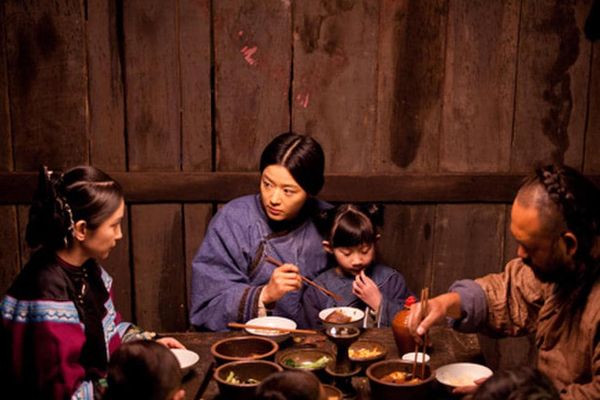Eye For Film >> Movies >> Snow Flower And The Secret Fan (2011) Film Review
Snow Flower And The Secret Fan
Reviewed by: Val Kermode

The title sounds like one a six-year-old would use for a mystery story. Unfortunately, mystery is lacking in this slow-moving tale of sisterly love.
Director Wayne Wang, of the far superior Joy Luck Club, has chosen to frame Lisa See's original story of two women in 19th century China with a story from modern Shanghai. The film takes us backwards and forwards in time, drawing its parallel female friendships, with Bingbing Li playing the parts of Lily in the past and Nina in the present, while Gianna Ju plays Snow Flower and present day Sophia.

Nina is called to the hospital where Sophia is in a coma following a bicycle accident. She is about to move to New York, but decides to stay with her friend and finds the manuscript of a book that Sophia is writing about her ancestor, Snow Flower.
Skipping briefly back to 1997, we learn that the young Nina and Sophia are such close friends that they have decided to become “laotong” - lifelong sisters. Nina learns that Lily and Snow Flower also became laotong as children, on the day of their footbinding. When the two girls were married they used their own secret language or “nu shu” to send messages written in the folds of a fan.
The last time Nina saw Sophia before her accident they quarrelled, and Nina sets out to discover what has been happening to her friend since then. As she reads, she realises how similar were the lives of the two women in the past, how they had the same quarrels, made the same sacrifices.
For sheer visual enjoyment, the scenes from old China do not disappoint. There is nothing here on a grand scale, no stunning landscapes or cast of thousands, but there are beautifully created and delicately lit intimate scenes - for instance, when a group of women are gathered for embroidery. Costume, makeup and particularly the elaborate hairstyles are ravishing. The dreamy pace allows us to contemplate the tedium and claustrophobia of these women's lives.
But there is no real exploration of the characters, particularly the present day women. Hugh Jackman as Sophia's love interest has a completely two dimensional role (and I never want to hear him sing in Chinese again.)
Despite all the lingering close ups, it's hard to feel anything for these women. And this is meant to be the sort of poignant story that has us weeping. The moral, spelled out at the end in case we missed it, is that the world is changing and we have to look inside ourselves to find something permanent – the bond between sisters.
Sisters, I'd give it a miss.
Reviewed on: 03 Nov 2011

















